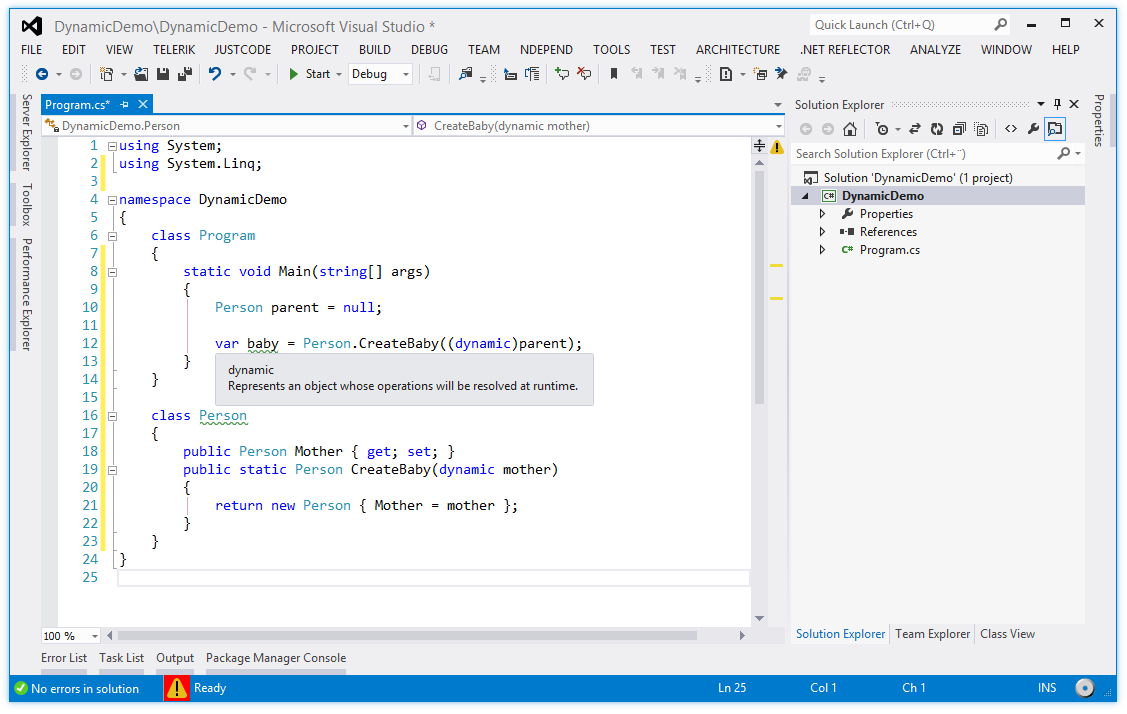I'm using dynamic and unexpectedly lost intellisense!
Posted by Filip Ekberg on 17 Jan 2013
I've written and talked quite a bit about dynamic before, both in this blog, on user groups and in my book C# Smorgasbord. I never get tired of talking about it though because there are always interesting new things to be found out. TheCodeJunkie (author of Nancy) asked something quite interesting on JabbR today which lead to an interesting discussion about dynamic (among other things).
The question and code sample is pretty easy, let's say that we have a class in which we have a static method that returns a new instance of that class. This method takes one parameter which is a dynamic type which means that we can end up with a class looking something like this:
class Person
{
public Person Mother { get; set; }
public static Person CreateBaby(dynamic mother)
{
return new Person { Mother = mother };
}
}
So the question that he asked was, what if we create an instance of it like you see in the following code, what type will the variable be? Because if it is dynamic, we will have lost intellisense.
static void Main(string[] args)
{
dynamic parent = null;
var baby = Person.CreateBaby(parent);
}
Without trying this in Visual Studio, what do you think? Leave a comment below telling me what you expected it to be and what it really was once you (continued reading) tried it for yourself!
At a first glance, it looks like the compiler will know that Person.CreateBaby returns a statically typed object of type Person. Before we take a look what happens, let's inspect the IL with reflector:
.method private hidebysig static void Main(string[] args) cil managed
{
.entrypoint
.maxstack 8
.locals init (
[0] object parent,
[1] object baby,
[2] class [Microsoft.CSharp]Microsoft.CSharp.RuntimeBinder.CSharpArgumentInfo[] CS$0$0000)
L_0000: nop
L_0001: ldnull
L_0002: stloc.0
L_0003: ldsfld class [System.Core]System.Runtime.CompilerServices.CallSite`1<class [mscorlib]System.Func`4<class [System.Core]System.Runtime.CompilerServices.CallSite, class [mscorlib]System.Type, object, object>> DynamicDemo.Program/<Main>o__SiteContainer0::<>p__Site1
L_0008: brtrue.s L_0049
L_000a: ldc.i4.0
L_000b: ldstr "CreateBaby"
L_0010: ldnull
L_0011: ldtoken DynamicDemo.Program
L_0016: call class [mscorlib]System.Type [mscorlib]System.Type::GetTypeFromHandle(valuetype [mscorlib]System.RuntimeTypeHandle)
L_001b: ldc.i4.2
L_001c: newarr [Microsoft.CSharp]Microsoft.CSharp.RuntimeBinder.CSharpArgumentInfo
L_0021: stloc.2
L_0022: ldloc.2
L_0023: ldc.i4.0
L_0024: ldc.i4.s 0x21
L_0026: ldnull
L_0027: call class [Microsoft.CSharp]Microsoft.CSharp.RuntimeBinder.CSharpArgumentInfo [Microsoft.CSharp]Microsoft.CSharp.RuntimeBinder.CSharpArgumentInfo::Create(valuetype [Microsoft.CSharp]Microsoft.CSharp.RuntimeBinder.CSharpArgumentInfoFlags, string)
L_002c: stelem.ref
L_002d: ldloc.2
L_002e: ldc.i4.1
L_002f: ldc.i4.0
L_0030: ldnull
L_0031: call class [Microsoft.CSharp]Microsoft.CSharp.RuntimeBinder.CSharpArgumentInfo [Microsoft.CSharp]Microsoft.CSharp.RuntimeBinder.CSharpArgumentInfo::Create(valuetype [Microsoft.CSharp]Microsoft.CSharp.RuntimeBinder.CSharpArgumentInfoFlags, string)
L_0036: stelem.ref
L_0037: ldloc.2
L_0038: call class [System.Core]System.Runtime.CompilerServices.CallSiteBinder [Microsoft.CSharp]Microsoft.CSharp.RuntimeBinder.Binder::InvokeMember(valuetype [Microsoft.CSharp]Microsoft.CSharp.RuntimeBinder.CSharpBinderFlags, string, class [mscorlib]System.Collections.Generic.IEnumerable`1<class [mscorlib]System.Type>, class [mscorlib]System.Type, class [mscorlib]System.Collections.Generic.IEnumerable`1<class [Microsoft.CSharp]Microsoft.CSharp.RuntimeBinder.CSharpArgumentInfo>)
L_003d: call class [System.Core]System.Runtime.CompilerServices.CallSite`1<!0> [System.Core]System.Runtime.CompilerServices.CallSite`1<class [mscorlib]System.Func`4<class [System.Core]System.Runtime.CompilerServices.CallSite, class [mscorlib]System.Type, object, object>>::Create(class [System.Core]System.Runtime.CompilerServices.CallSiteBinder)
L_0042: stsfld class [System.Core]System.Runtime.CompilerServices.CallSite`1<class [mscorlib]System.Func`4<class [System.Core]System.Runtime.CompilerServices.CallSite, class [mscorlib]System.Type, object, object>> DynamicDemo.Program/<Main>o__SiteContainer0::<>p__Site1
L_0047: br.s L_0049
L_0049: ldsfld class [System.Core]System.Runtime.CompilerServices.CallSite`1<class [mscorlib]System.Func`4<class [System.Core]System.Runtime.CompilerServices.CallSite, class [mscorlib]System.Type, object, object>> DynamicDemo.Program/<Main>o__SiteContainer0::<>p__Site1
L_004e: ldfld !0 [System.Core]System.Runtime.CompilerServices.CallSite`1<class [mscorlib]System.Func`4<class [System.Core]System.Runtime.CompilerServices.CallSite, class [mscorlib]System.Type, object, object>>::Target
L_0053: ldsfld class [System.Core]System.Runtime.CompilerServices.CallSite`1<class [mscorlib]System.Func`4<class [System.Core]System.Runtime.CompilerServices.CallSite, class [mscorlib]System.Type, object, object>> DynamicDemo.Program/<Main>o__SiteContainer0::<>p__Site1
L_0058: ldtoken DynamicDemo.Person
L_005d: call class [mscorlib]System.Type [mscorlib]System.Type::GetTypeFromHandle(valuetype [mscorlib]System.RuntimeTypeHandle)
L_0062: ldloc.0
L_0063: callvirt instance !3 [mscorlib]System.Func`4<class [System.Core]System.Runtime.CompilerServices.CallSite, class [mscorlib]System.Type, object, object>::Invoke(!0, !1, !2)
L_0068: stloc.1
L_0069: ret
}
That does look like a lot of code for just two lines, right? So most likely it wasn't as simple as the variable being a static type. By looking over the IL above, you'll see that a lot of runtime stuff is going on and that we in fact see a lot of dynamic here. Let's compare the IL to what it will look like, if we make a simple modification to the code by just changing the variable parent to a static type instead:
static void Main(string[] args)
{
Person parent = null;
var baby = Person.CreateBaby(parent);
}
The IL produced from this is much easier on the eyes:
.method private hidebysig static void Main(string[] args) cil managed
{
.entrypoint
.maxstack 1
.locals init (
[0] object parent,
[1] class DynamicDemo.Person baby)
L_0000: nop
L_0001: ldnull
L_0002: stloc.0
L_0003: ldloc.0
L_0004: call class DynamicDemo.Person DynamicDemo.Person::CreateBaby(object)
L_0009: stloc.1
L_000a: ret
}
We still have a dynamic parameter on the method that we are calling so we would have an equal amount of IL as we saw before on that type!
So what did we actually answer here? Simply put what happens when the use of dynamic is in place, the line of code will be evaluated at runtime. If you try casting the statically typed local variable when we pass it to the method, it will be the same behavior as if it was dynamic all along, as you can see in the below screenshot.

Did it work as you expected? Leave a comment and let me know!
 Filip Ekberg is a Principal Consultant at fekberg AB in the country with all the polar bears, Microsoft C# MVP, author of a self-published C# programming book, Pluralsight author and overall in love with programming.
Filip Ekberg is a Principal Consultant at fekberg AB in the country with all the polar bears, Microsoft C# MVP, author of a self-published C# programming book, Pluralsight author and overall in love with programming.




